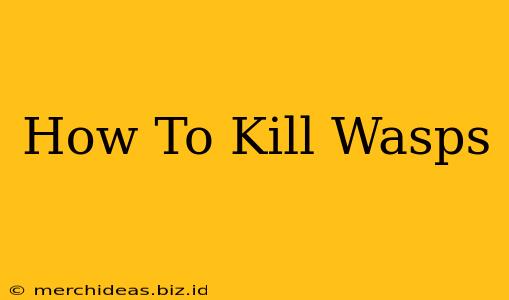Wasps. The buzzing menace of summer picnics and backyard barbecues. While they play a vital role in the ecosystem, their aggressive nature and painful stings make them unwelcome guests in many homes. This guide will explore safe and effective methods on how to kill wasps, helping you reclaim your outdoor spaces. Remember: Always prioritize safety when dealing with wasps.
Understanding Wasp Behavior: The First Step to Effective Control
Before you reach for the insecticide, understanding wasp behavior is crucial for effective wasp control. Knowing their nests' location, their activity patterns, and the types of wasps you're dealing with will significantly improve your chances of successful removal.
Identifying the Wasp Species
Different wasp species exhibit different behaviors. Some are more aggressive than others. Identifying the species can help determine the best course of action. Common species include:
- Yellow Jackets: Known for their aggressive behavior and tendency to nest underground.
- Paper Wasps: Build exposed nests, often under eaves or on tree branches. They are generally less aggressive unless their nests are disturbed.
- Hornets: Larger than yellow jackets and paper wasps, hornets build large, enclosed nests, often in trees or attics. They can be quite aggressive.
Safe and Effective Wasp Killing Methods
There are various methods for wasp control, ranging from DIY solutions to professional intervention. Choose the method that best suits your situation and comfort level.
1. Commercial Wasp and Hornet Sprays
Readily available at most hardware stores, these sprays offer a quick and effective solution for killing wasps. Always follow the instructions carefully and wear protective clothing, including gloves and eye protection. Aim for the nest at dusk or dawn when wasps are less active.
2. Wasp Traps
Wasp traps lure wasps with bait and then trap them. These are a less aggressive approach and are particularly useful for dealing with smaller wasp populations. Place traps strategically near areas where wasps are commonly seen.
3. Natural Remedies
While less reliable than commercial sprays, some natural remedies claim to deter or kill wasps. These include:
- Vinegar: Some suggest spraying vinegar on wasps, but its effectiveness is questionable.
- Essential Oils: Certain essential oils, like peppermint oil, may deter wasps, but they are not a guaranteed kill method. It's important to note that there's limited scientific evidence to support the effectiveness of these methods.
4. Professional Pest Control
For large nests or if you're uncomfortable dealing with wasps yourself, calling a professional pest control service is the safest option. Professionals have the experience and equipment to handle wasp removal safely and effectively.
Preventing Future Wasp Infestations
Preventing future infestations is often easier than dealing with them. Here are some preventative measures:
- Seal cracks and crevices: Wasps often enter homes through small gaps and openings.
- Remove food sources: Keep food and drinks covered, especially outdoors.
- Maintain a clean yard: Remove rotting wood, fallen fruit, and other debris that can attract wasps.
Safety Precautions: Your Top Priority
Always prioritize safety when dealing with wasps. Never attempt to remove a wasp nest during the day when wasps are most active. Wear protective clothing, including long sleeves, long pants, gloves, and eye protection. If stung, seek medical attention if you experience an allergic reaction.
Conclusion: Reclaiming Your Space from Wasps
Dealing with wasps effectively requires a combination of understanding their behavior, choosing the right removal method, and prioritizing safety. By following the guidelines in this guide, you can successfully eliminate wasps from your property and enjoy your outdoor spaces wasp-free. Remember, prevention is key. By taking preventative measures, you can minimize the chances of future infestations.
